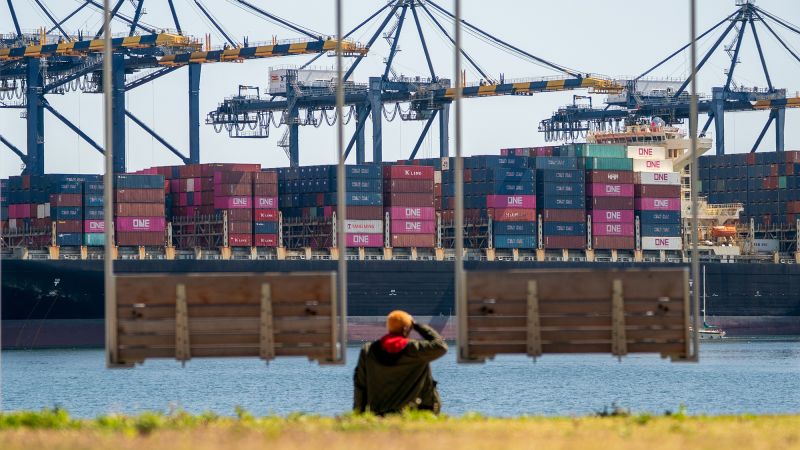New York
CNN
—
President Donald Trump often champions major corporate investments as evidence that his economic agenda is starting to work.
But his chaotic policymaking could have the opposite effect: It could paralyze businesses.
It’s hard to imagine a more chaotic and murky environment than the opening act of this Trump presidency. And for CEOs to commit billions of dollars in years-long projects in America, they need stability and clarity.
Markets are melting down (except when they’re melting up on false rumors), trade war turbulence is off the charts, and consumer confidence is plunging.
“Without a doubt, this could freeze things rather than spur investment,” said John Graham, finance professor at Duke University.
These days, it’s difficult for CEOs to know what’s going to happen in the next 10 minutes, let alone the next 10 months. They may opt to cancel hiring plans, or even lay off workers. For every company that decides to invest in a factory to avoid tariffs, another may be too nervous to spend at all.
“It’s hard for business leaders to see down the road very far right now,” Graham said. “There is a lot of dust in the air and it will have to settle before people can make predictions that will lead to an increase in manufacturing in the United States.”
James Bullard, former president of the Federal Reserve Bank of St. Louis, told CNBC on Monday that there is a growing risk of a repeat of the Smoot-Hawley Act, the infamous 1930 tariff hike that worsened the Great Depression. European countries had retaliated with tariffs of their own, and US imports fell 40% in the two years following Smoot-Hawley.
“Who wants to invest when you don’t know what the rules are going to be?” Bullard said.
Mary Lovely, senior fellow at the Peterson Institute for International Economics, said companies will struggle to invest if they don’t know how enduring tariffs are.
“The uncertainty is at a level many of us have never seen before,” Lovely said.

Even some of Trump’s supporters are making this point about chaos hurting investment.
Bill Ackman, the hedge fund billionaire who endorsed Trump last election, warned that “business investment will grind to a halt” if the president doesn’t pause the tariffs. Although he agrees with Trump’s broader point that some nations have “taken advantage” of the United States and killed millions of jobs with unfair trade tactics, he has expressed concerns about a full-scale trade war.
“By placing massive and disproportionate tariffs on our friends and our enemies alike and thereby launching a global economic war against the whole world at once,” Ackman said in a post on X, “we are in the process of destroying confidence in our country as a trading partner, as a place to do business, and as a market to invest capital.”
The tariff threats have made it almost impossible for businesses to plan. Many can’t figure out the cost of their goods if they don’t know whether tariffs on Mexico and China will be 0% or 50%.
And without knowing if other countries will slap retaliatory tariffs on them, businesses don’t know what the demand will be for their goods.
It’s true that the market is not the economy. And Wall Street is not Main Street.
But they are inextricably linked, and US markets have plunged precipitously in response to the developing trade war. In short, investors are freaked out.
And market meltdowns have real economic impact: “When markets crash, new investment stops, consumers stop spending money, and businesses have no choice but to curtail investment and fire workers,” Ackman said.
Lovely said it’s “anyone’s guess what the value of the dollar is going to be tomorrow, let alone 10 weeks from now.”
That makes it hard for multinational CEOs to plan how much to invest and where to do it.
Trump’s trade war has led CEOs and investment banks to warn of a potential recession — warnings that will also make companies think twice before hiring or investing.
Even the oil industry, among Trump’s biggest supporters, is getting fed up with his chaos.
On the campaign trail, the president had promised to usher in a period of American energy dominance and dirt-cheap gas prices by cutting red tape. Those deregulatory promises are currently being completely overshadowed by the turbulence out of Washington.
“The administration’s chaos is a disaster for the commodity markets. ‘Drill, baby, drill’ is nothing short of a myth and populist rallying cry,” one oil executive told the Dallas Fed in a survey released last month. “Tariff policy is impossible for us to predict and doesn’t have a clear goal. We want more stability.”
The silver lining might be that it’s hard to fathom an environment with less stability.

